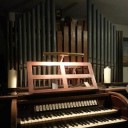Hi all, I have a midi enabled Viscount organ and am interested in setting it up to use with GO. Will probably go down the route of building a small PC specifically for use with GO. Any suggestions? Windows or Linux? Active Speakers? Best midi interface / usb to Midi cables? Would be really grateful for any advice. Cheers. James ![]()
PC Spec for running GrandOrgue
-
-
Hi; It depends what kind of music you're interested in.
If you want to play the baroque school, then there
are many small organs to choose from and they
don't required too much RAM. I can only speak
for Windows---7 pro 64bit is best. If you want something
grander or bigger, then you need at least 8Gig RAM.
There are several sample sets converted from Hauptwerk
to GO, but they take a lot of RAM. If you go to some of the
AGO extended samples available for Grand Orgue, then
the 8 gig RAM will work. Just depends on what you want to
play. If you have a Viscount, then I assume you will not
be playing through headphones, so you need speakers and
an amp for the main output, and possibly a powered subwoofer.
I use generic, over the internet, usb/MIDI cables that about $5-6 each.
Are in you in the US or Europe? Michael will probably have some ideas, also.
If you are a proficient player, you may want to consider OMNI when it
is put on this website. All the best, Ken Barta -
State of the art HW samplesets are growing - I would not be surprised, if samplesets > 64 GB will get released in the next years.
I would suggest for a future prove solution:
* lots of RAM [if you don't want currently a large RAM, use fewer, but larger RAM modules, so that you can more modules in the future]
* a fast CPU
* cheap graphic card [onboard] - performance does not matter
* large hard-disk [if you start collecting samplesets]. A faster read performance reduces load times.
* GO/HW just use the D/A converter of any soundcard - so unless you can hear the difference between the D/A converter of the onboard sound and a more expensive soundcard, extra soundcards provide no benefit.
* GO has good Linux support, so there is no need to buy a Windows license. -
- Offizieller Beitrag
Hi James,
like Ken says, it primarily depends on the sample set you want to play. For very small solutions, GO can even run on a raspberry pi.
For economic use (no power user) I would suggest an Intel i5 CPU, a board with 4 RAM sockets and for beginning with 2 x 8 GB = 16 GB RAM. ( Intel CPUs usually in this case give more performance than AMD )
For boot drive a SSD min. 128 GB and for sample data a HDD min. 1 TB. This gives short startup times.
With such a configuration you can play also a lot of converted HW sets with good quality. Optionally extend to 32 GB RAM later.
Use Windows (64bit) or Linux (64bit) what you prefer. GO is working fine at both.
Advantage of Linux: it´s for free, and you can just turn off the power after playing, without waiting until the computer is going down.Today the onboard sound chips have a very good quality. Mostly there is no need to buy an expensive sound card. A good (maybe cheap) USB Midi cable should be enough.
If you mostly play for your self, then a pair of good, not too small, active studio monitor speakers is a good choice. If you can afford, then the Genelec M040 are a very good choice. Maybe an active sub later.
Regards Michael
-
Hi there,
I'm a newbie really as far as GO goes, but plenty experience with electronic organs, and one general rule you can follow is use as many sound channels as you can get, and split the stops around them. The effect on chorusing is quite substantial - an easy demo of this is to compare the sound from for instance a Lieblich and a Vox Humana style stop when they are mixed onto one speaker and when they are on individual channels.
It's also worth putting a lot of the 16' pitches onto their own channels.
Good luck, have fun!
Jzz -
I am running the OMNI Sample Set (4M+P) which is huge, using an HP-COMPAQ ELITE 8300 with Intel core i5 3470S and 8GB RAM. Operating System is LINUX MINT 17.3 64-bit. Works great!
-
PS - bought the machine with 4GB RAM at $165.00 at a surplus non-profit store. They got in a bunch as a donation from a local credit union. Added another 4GB RAM stick and installed LINUX.
-
I would add that with my dual-boot computer, the LINUX system far out-performs the Windows boot with the same resources. Run 64-bit LINUX Mint. Even the Polyphany number shows up far higher under LINUX.
-

Mikelectric
5. Januar 2019 um 15:52 Hat das Thema aus dem Forum English nach GrandOrgue English verschoben. -

Mikelectric
15. Januar 2022 um 00:24 Hat das Thema aus dem Forum GrandOrgue English nach GrandOrgue verschoben.

